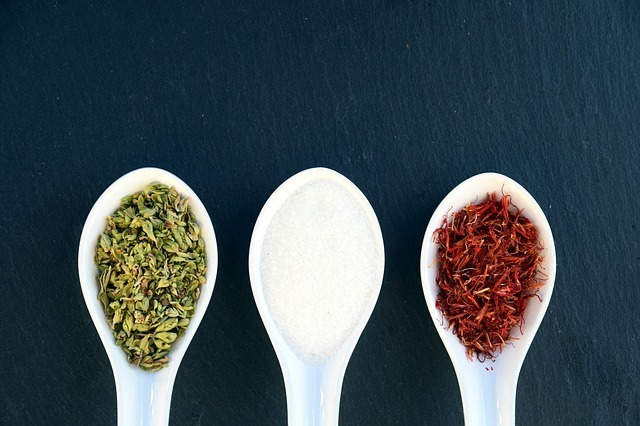Adding spices and herbs not only adds flavor to your food but may also help improve 24-hour ambulatory blood pressure, according to a new study.
Published in The American Journal of Clinical Nutrition, the study shows that consuming a diet high in herbs and spices may benefit those with cardiometabolic diseases.1
Are herbs and spices healthy?
Previous studies have shown that herbs and spices reduce high blood sugar, high cholesterol, and oxidative stress, which can damage body cells.1
However, the extent of the benefit of herbs and spices on people with cardiometabolic diseases is unknown.
This study set out to better understand the benefit of species on these individuals with diseases such as type 2 diabetes, heart disease, and stroke.
Spices and herbs must be consumed in relatively high amounts to significantly reduce blood pressure
The study created three different diets, each with different levels of herbs and spices: low, medium, and high dosages including about 0.5 grams, 3.2 grams, and 6.5 grams per day, respectively.1
Each diet included 2,100 calories per day on a non-ideal diet U.S. diet. By “non-ideal”, the study is referencing that sodium and other foods deemed “unhealthy” were not removed.
A combination of 24 spices and herbs was used in each diet.
The herbs and spices that were administered in the highest relative concentrations included cinnamon, coriander, ginger, cumin, and parsley.
The study included 71 participants from Penn State University, each with a risk of cardiometabolic disease.
They were each assigned one of the three diets for a four-week period. After a minimum of two weeks of ‘wash-out’, a different diet was assigned for the next four weeks.
By the end of the study, each participant tried all three diets.
Both systolic and diastolic 24-hour ambulatory blood pressure was measured for each diet. 24-hour blood pressure is a continuous measure of blood pressure, including when the participant sleeps.
The high herb and spice diet showed significantly improved 24-hour ambulatory blood pressure compared to both the medium and low spice/herb diets.
Adding herbs and spices to lower blood pressure may be a viable alternative to reducing sodium
For individuals with cardiometabolic disease, reducing sodium intake is a common way to lower blood pressure.
However, compliance may limit the effectiveness of sodium reduction because salt enhances the flavor of foods.
Herein lies the significance of this study’s findings.
Professor of Nutritional Sciences at Evan Pugh University, Penny Kris-Etherton noted, “Adding herbs and spices to your food is a great way to add flavor without adding extra sodium, sugar, or saturated fat.”2
The study was designed purposely not to lower the salt content of each diet; they wanted to focus on the effects of additional herbs and spices only.
However, the researchers suggest that analyzing the combined effect of adding spice and herbs to a low-salt diet, a high-vegetable diet would be beneficial to better understand the optimal diet for people at risk for cardiometabolic diseases.1
Relevant topics that may be of interest to you:
- How common is high blood pressure in children?
- What is the Relationship between Alcohol and Blood Pressure?
- Could blood pressure drugs have potential as a medication for Alzheimer’s disease?
- The Blood Pressure Myth
- Effective Ways to Lower High Blood Pressure
- Targeting the Immune Cells to Treat High Blood Pressure
- Do Nitrate-Rich Vegetables Lower High Blood Pressure?
References
- Petersen, K.S. et al. (2021). Herbs and spices at a relatively high culinary dosage improves 24-hour ambulatory blood pressure in adults at risk of cardiometabolic diseases: a randomized, crossover, controlled-feeding study. The American Journal of Clinical Nutrition; nqab291. Doi: 10.1093/ajcn/nqab291.
- Bohn, K. (2021). Adding herbs and spices to meals may help lower blood pressure. EurekAlert! Accessed on Nov. 11, 2021. Retrieved from https://www.eurekalert.org/news-releases/934137.
- Image by Ulrike Leone from Pixabay



